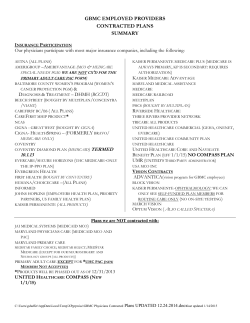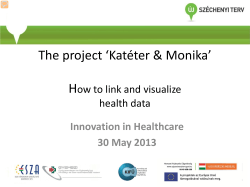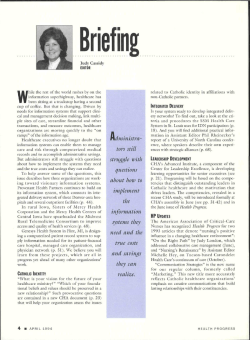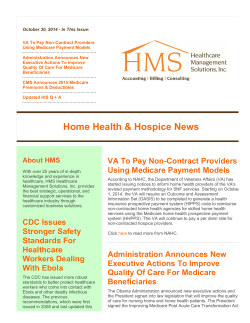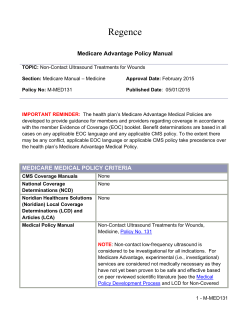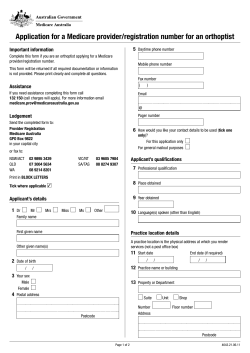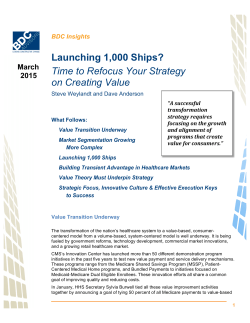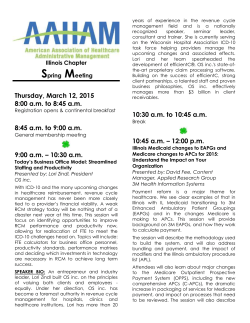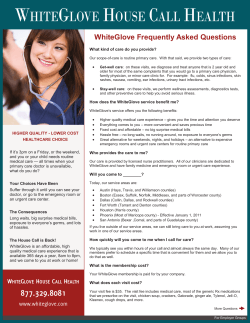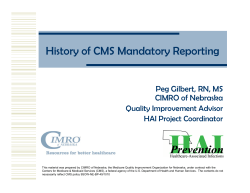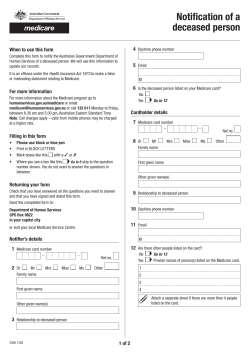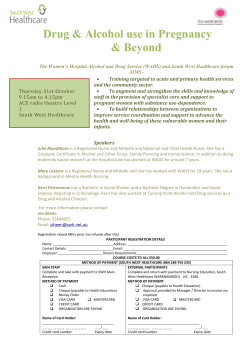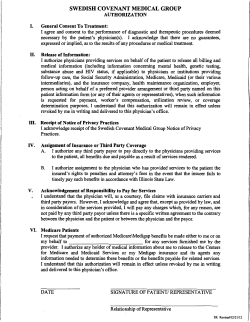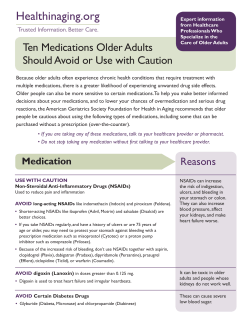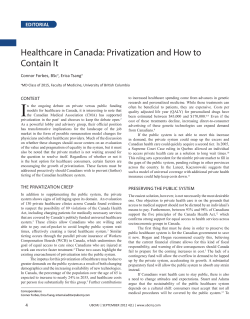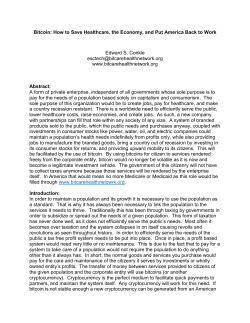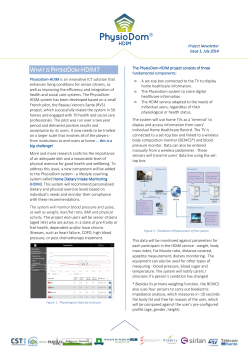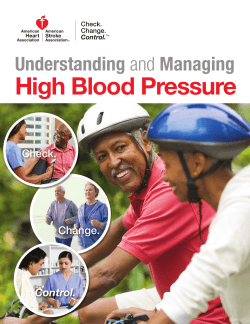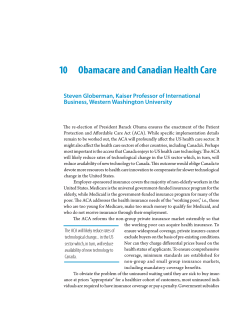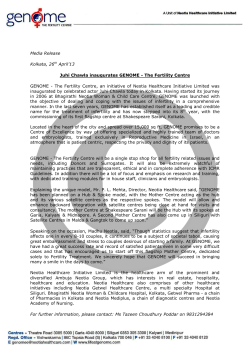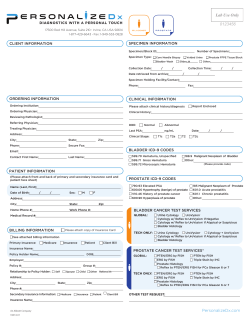
The ACA A PhysiciAn’s PersPective By Peter A. DeGolia
The ACA A Physician’s Perspective By Peter A. DeGolia I am a geriatrician, a doctor who specializes in the care of older adults. I am board certified in family medicine, geriatric medicine, and hospice/palliative medicine. For 18 years, I have been caring for older adults and people with chronic diseases. I have an active house calls practice in which I see homebound seniors who cannot access primary care because leaving their homes is a burden to them or their families. I know first-hand the problems associated with a fragmented, acute-care-focused health insurance system that costs too much, covers too little, and excludes too many. It also does not match the needs of older adults or people with chronic medical problems who require more than just 15 minutes with their primary care provider. Sometimes I can’t get through my patient’s medication lists in 15 minutes! Individuals with complicated needs often require team-based care, as many of their problems are not just biomedical in nature but are, rather, intertwined with social and psychological issues. In February 2012, together with a group of colleagues, I decided that too few in our community really knew anything about the new healthcare law, the Affordable Care Act (ACA). There was already a lot of noise and misinformation about the new law in the news and on the Internet. I was surprised by how little my medical colleagues actually knew about the law. Our group decided that we had an obligation to help educate our community about this new law. We believe that doctors and nurses are still highly respected within our community and that we have important information to share. Together with the Universal Health Care Action Network (UHCAN), we organized training sessions and created a speakers Image: Corbis Published in Experience, Volume 22, Number 3, 2013. © 2013 by the American Bar Association. Reproduced with permission. All rights reserved. This information or any portion thereof may not be copied or disseminated in any form or by any means or stored in an electronic database or retrieval system without the express written consent of the American Bar Association. 1 Peter A. DeGolia (peter.degolia@ uhhospitals.org), MD, is a geriatrician and family physician. He is a professor of family medicine and community health and the Jack H. Medalie Endowed Professor in Home-Centered Health Care at Case Western Reserve University School of Medicine. He is also director of the Center for Geriatric Medicine and Palliative Care at University Hospitals of Cleveland, as well as medical director of McGregor PACE (Program of All-Inclusive Care for the Elderly), which enables low-income seniors in the Greater Cleveland area to age at home rather than in costlier residential care facilities. bureau called “Ask a Doc.” Since March 2012, we have presented to more than 50 groups totaling over 3,000 people. These presentations have ranged from medical groups to community forums to senior centers. I always start my presentations off with a story. Coverage for Prescription Medications “Hey doc, guess what?” was the first thing that Mrs. P asked me when I walked into her house to see her one afternoon in early September. Usually, she lets me know right from the get-go what I’m not doing or how I could provide better care to seniors. For this 92-year-old, spunky, Polish-American woman who lives in Slavic Village on Cleveland’s South Side, I learned to listen carefully and express myself slowly. Mrs. P has severe end-stage emphysema and requires continuous oxygen. I have seen her through good times and bad. I have her on some very expensive brand-name medications because the generic brand caused her heart to race whenever she used her inhalation treatments. Since I made this change, she has felt much better, but her pocketbook took a big hit and she let me know it. I was certain she was going to give me an earful at this visit as well. Instead, Mrs. P explained to me that she had just received her bill from Medicare and she wanted me to know that she would be paying $600 less this year when she hits the “donut hole.” She was ecstatic, beaming from ear to ear! The “donut hole” is the nickname for the period of time during which Medicare beneficiaries must pay out of pocket for all their medications. This period begins after they reach Part D’s initial coverage limit ($2,930 in 2012) and ends when “catastrophic” coverage kicks in (at $4,700 in 2012). At that latter point, coverage for prescription drugs begins again. In 2020, the donut hole will be eliminated altogether. In fact, the new healthcare law has already cut the cost of out-of-pocket payments on covered brand-name medications by 50 percent this year for Medicare Part D beneficiaries in the donut hole. That reduction saved Mrs. P a whole lot of money. Since she is on a fixed income, every dollar saved is a big deal to her. She wanted me to know about her good fortune right away. Coverage for Preventive Care I have a patient named Willard who has a strong family history of colon cancer. He is a truck driver for a small company and did not have very good health insurance before he turned 65 years of age and got onto Medicare. Even then he refused to pay the extra cost for a screening colonoscopy to look for colon cancer. I tried to explain to Willard how it could be cheaper in the long run to screen for this disease since he had two first-degree relatives who developed colon cancer. He would not budge. He could not afford it. He was without symptoms. With the passage of the new healthcare law and his going onto Medicare, I immediately contacted him and explained to him that he could now have a screening colonoscopy performed without paying extra. The ACA allows for payment for 24 prevention services, including specific tests, examinations, and counseling to target potentially treatable life-threatening or chronic diseases. Colon cancer is a readily treatable disease if found early. Willard was at very high risk and needed to be screened. With the passage of the ACA, Willard could now have his screening colonoscopy without having to pay additional out-of-pocket costs. He agreed to have the test, and two precancerous growths were found and removed! His next colonoscopy won’t be a screening test, but we eliminated a major problem that could have caused death or misery, as well as significantly greater healthcare costs. The new healthcare law provides free annual wellness examinations. Primary care providers are expected to focus on developing a personal prevention plan with each patient and to identify for the patient which of the 24 preventive services are appropriate for him or her given his or her age and health history. Services such as influenza and pneumococcal pneumonia vaccinations, pap smears, mammograms, colonoscopies, mental health screenings, nutritional Published in Experience, Volume 22, Number 3, 2013. © 2013 by the American Bar Association. Reproduced with permission. All rights reserved. This information or any portion thereof may not be copied or disseminated in any form or by any means or stored in an electronic database or retrieval system without the express written consent of the American Bar Association. 2 counseling, and smoking cessation/counseling are some of the free health services now available to all Medicare and Medicaid beneficiaries. Beginning in August 2012, these requirements were extended to all new private health insurance plans as well. Prevention of Fraud, Waste, and Abuse I was contacted by the grandson of a bedbound patient to ask me to take over his grandmother’s medical care. He reported that a for-profit visiting physician’s organization had made a home visit recently to establish care for his grandmother and had ended up billing her insurance for nearly $4,000. She was expected to pay $800 out-of-pocket. When I asked what had been done, he said, “Everything.” This included many unnecessary but billable tests, including several radiologic studies done in the home by the provider, minor procedures, and extensive blood work. The grandson did not understand that some of these things were not medically necessary or that his grandmother would have to pay 20 percent of the outof-pocket costs. ranging from services billed for but not provided, to services that do not meet medical necessity, to overbilling for services. A large number of older adults with multiple chronic health problems report duplicate tests and procedures, conflicting diagnoses for the same set of symptoms, and contradictory medical information. See Gerard Anderson, Chronic Care: Making the Case for Ongoing Care (2010), available at www.rwjf. org/content/dam/web-assets/2010/01/ chronic-care; see also www.fightchronic disease.org. Drs. Agrawal and Budetti describe the problem of physician medical identity theft in their February 1, 2012, article in the Journal of the American Medical Association (Vol. 307, No. 5). They describe how a physician applied to and interviewed at a medical practice but chose not to work for the group. Nearly two years later, Medicare asked this physician to return $350,000 in overpayments made to the practice he had interviewed with but never joined. The Department of Treasury began to garnish his Social Security payments for The new healthcare law is a small but significant step toward meaningful change that has already benefited millions of Americans. The Economist reported on June 17, 2011, that the estimated U.S. healthcare spending waste for 2009 ranged from $600 to $800 billion. The cost of unnecessary care ranged from $250 to $325 billion, and the cost of fraud and abuse was put at $125 to $175 billion. Other estimated waste categories included administrative inefficiencies, hospital inefficiencies, uncoordinated care, and avoidable care. Under our current health insurance system, providers are paid for doing things—for quantity, but not necessarily for quality. Medicare expects all visits, tests, and procedures to be performed based on medical necessity. We practitioners must use our clinical judgment to make decisions and record justification of the medical necessity for things we do or order. However, Medicare fraud and abuse has become a serious problem, unpaid debts. The subsequent investigation revealed his medical identity had been stolen by a fraudulent clinical practice that was part of a complex Medicare fraud scheme that victimized numerous physicians and resulted in the criminal conviction of six perpetrators. The new healthcare law establishes strong anti-fraud measures, including tougher penalties for criminals. Hotlines now exist for reporting of potential physician medical identity theft: 1-800-MEDICARE and 1-800-HHS-TIPS. Innovations in Healthcare Delivery Mrs. J is an elderly African-American woman who lives alone in an independent senior living apartment building on Cleveland’s Southeast Side. She has Medicare and Medicaid health insurance. Her health problems consist of early Alzheimer’s disease, hypertension, Published in Experience, Volume 22, Number 3, 2013. © 2013 by the American Bar Association. Reproduced with permission. All rights reserved. This information or any portion thereof may not be copied or disseminated in any form or by any means or stored in an electronic database or retrieval system without the express written consent of the American Bar Association. 3 and diabetes mellitus with complications including skin and vascular disease, kidney insufficiency, and nerve damage. She has a wheelchair, two walkers, a cane, a tub chair, and plenty of diabetic supplies. She has a skilled nursing service coming to her home weekly, as well as nonskilled home care provided by an aide two hours a day, five days a week. She has a wound care doctor, a renal doctor, and a diabetologist, in addition to me! What she does not have is good coordinated care. Despite all these services, she has been hospitalized three times in the past six months. To prevent her health from deteriorating further, it is essential to control her blood pressure and maintain her blood sugar in a safe range. However, because of her memory problems, she frequently forgets to take her medication. There are signs everywhere in her apartment instructing her about what to do or not to do. Despite all this, she continues to not take her medications properly or do the other things she needs to do to remain safe in her home. The home health aide does not communicate with the home care nurse (two different agencies), and the nurse does not communicate with her primary doctor (two different agencies). She needs the coordinated services of a physician, nurse, and social worker who communicate effectively together and who work together to improve the care of their patient. She needs one physician directing these services so that Mrs. J can receive the right care at the right time in the right place. Without this, she will not be able to remain living in the community. Managing the care of dual eligible individuals (insured by both Medicare and Medicaid) is expensive and very challenging. This is a small but expensive segment of our society. It truly takes a team to effectively coordinate the care of these individuals. People with complicated health conditions need care coordination. We also need to control unnecessary and excessive spending on wasteful care. These factors are behind changes built into the ACA. The new law provides for the development of “accountable care organizations,” entities that will be accountable for the quality of care provided to their members through the promotion of good communication and coordinated and comprehensive care. The new law established the MedicareMedicaid Coordination Office to bring these two health insurance systems together to provide better care and services for the dual eligible population. It created the Center for Medicare and Medicaid Innovation to fund efforts, such as “Transition Coach Initiatives,” to find new ways of providing “better care at lower costs.” Transition coaches are nurses or social workers who work with hospitalized patients and families to help them understand how they can take control of their healthcare needs. They act as patient advocates to educate patients about their principle diseases, factors that cause these diseases to get out of control, medications they are taking, and questions they should ask their doctor. This simple intervention has been shown to significantly reduce the readmission rates of patients to hospitals. Health care is rapidly changing. The way things were done in the past cannot be the way we do things in the future. The new healthcare law is a small but significant step toward promoting meaningful change. It has already benefited millions of Americans, be they children who can no longer be denied health insurance because of preexisting conditions, young adults who have access to their parents’ health insurance plans, or older Americans who now receive preventive services without paying out-of-pocket costs. Key to controlling healthcare costs in the future and improving health services for all Americans will be our ability to build a meaningful healthcare system that emphasizes preventive care and continuity of care; quality, rather than quantity, of services provided; and insuring the uninsured. Right now we have a healthcare industry. We need a healthcare system that places the patient and the patientprovider relationship at the center of care. The new healthcare law begins to acknowledge this and is an effort to redirect our health service ship. We have a long way to go. Achieving meaningful and sustained reform will require the engagement of all our citizenry. n Published in Experience, Volume 22, Number 3, 2013. © 2013 by the American Bar Association. Reproduced with permission. All rights reserved. This information or any portion thereof may not be copied or disseminated in any form or by any means or stored in an electronic database or retrieval system without the express written consent of the American Bar Association. 4
© Copyright 2025
